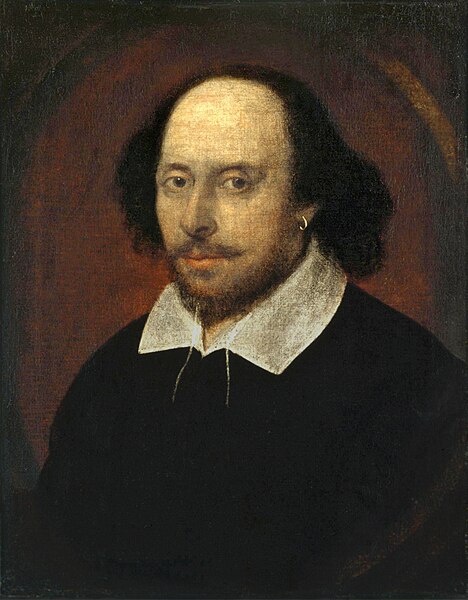General Discussion
Related: Editorials & Other Articles, Issue Forums, Alliance Forums, Region ForumsWilliam Shakespeare born on or about April 23, 1564
[center]

[/center][font size="1"]The Chandos Portrait of Shakespeare, believed to be by Richard Burbage, from Wikimedia Commons
(Public Domain)
[/font]
William Shakespeare was born on or about April 23,1564, in Stratford-upon-Avon, Warwickshire, and baptized on April 26. His father, John Shakespeare, was a glove maker and the bailiff of Stratford, a position approximately equivalent to the modern office of mayor. His mother, Mary Arden Shakespeare, came from a Roman Catholic family; there has been much speculation about Shakespeare’s own religious affiliation over the last 400 years. As the son of a local official, Shakespeare had to opportunity to attend grammar school, where he was given a classical education.
At the age of eighteen, Shakespeare married Anne Hathaway, a lady eight years older than he. Six months later, she presented him with their first child.
The details of Shakespeare’s life during this period are sketchy, but it appears that by the late 1580s he was an actor in London. He collaborated with other dramatists in London to produce the earliest plays of the Shakespearean canon, the three parts of HenryVI and Richard III in the early 1590s. Also first performed during this period were two plays written on classical Roman models, A Comedy of Errors and Titus Andronicus. The latter was a very popular play in its time, although it is not highly regarded nowadays.
An outbreak of plague closed the theaters in 1592. Shakespeare became the court poet for the Earl of Southampton, probably with the help of his lordship’s mother, who wanted Shakespeare to write sonnets encouraging the young earl to find a wife. Most of Shakespeare’s sonnets, including Sonnet 18 (Shall I compare thee to a summer’s day?) were addressed to Lord Southampton. Those that were not were addressed to a mysterious “dark lady” with whom Shakespeare had an adulterous affair. Among these is Sonnet 130:
My mistress' eyes are nothing like the sun;
Coral is far more red, than her lips red:
If snow be white, why then her breasts are dun;
If hairs be wires, black wires grow on her head.
I have seen roses damasked, red and white,
But no such roses see I in her cheeks;
And in some perfumes is there more delight
Than in the breath that from my mistress reeks.
I love to hear her speak, yet well I know
That music hath a far more pleasing sound:
I grant I never saw a goddess go,
My mistress, when she walks, treads on the ground:
And yet by heaven, I think my love as rare,
As any she belied with false compare.
Shakespeare also wrote his two narrative poems, Venus and Adonis and The Rape of Lucrece, in service to Lord Southampton. Some of Shakespeare’s best dramas were written at this time and probably first performed at Southampton Court, including A Midsummer Night’s Dream, which may have been written for the Dowager Duchess’ wedding in 1594.
When the theaters re-opened in 1594, Shakespeare and some fellow actors formed a theater group under the protection of the Lord Chamberlain. Among the other shareholders in the troupe was Richard Burbage, one of the leading actors of London at the time. Burbage was the first actor to perform such parts as Romeo, Hamlet, Othello, Lear and Macbeth. Shakespeare’s first plays for the Lord Chamberlain’s Men were Romeo and Juliet, King John, Richard II, the two parts of Henry IV and Henry V. From the middle to the late 1590s to the early 1600s, Shakespeare wrote his best comedies, The Merchant of Venice, Much Ado about Nothing, As You Like It and Twelfth Night. During this time, he also began experimenting with tragedy, writing Julius Caesar in 1599 and Hamlet in 1601. The problem comedies, All’s Well that Ends Well, Troilus and Cressida and Measure for Measure were written the early 1600s.
In 1599, the Lord Chamberlain’s Men, now one of London’s best-known troupes, moved to their new home in the Globe Theater. In 1603, the troupe came under the direct protection of the newly crowned monarch, King James, and the troupe was thereafter known as the King’s Men.
Shakespeare continued writing tragedies into the late 1600s: Othello (1604), /i]King Lear (1605), Macbeth (1606), Antony and Cleopatra (1607) and Coriolanus (1608). In 1608, the King’s Men, seeking a more upscale audience, purchased an indoor theatre in the Blackfriars district of London. This called for plays with quieter dialog and more spectacular stage effects. In this vain, Shakespeare wrote Cymbeline, The Winter’s Tale, Pericles and The Temptest. The speech given by Prospero at the end of The Tempest is sometimes taken to be Shakespeare’s farewell to the theater, but it is more likely to have been written for Richard Burbage in what may have been his last lead role:
Now my charms are all o'erthrown,
And what strength I have's mine own,
Which is most faint: now, 'tis true,
I must be here confined by you,
Or sent to Naples. Let me not,
Since I have my dukedom got
And pardon'd the deceiver, dwell
In this bare island by your spell;
But release me from my bands
With the help of your good hands:
Gentle breath of yours my sails
Must fill, or else my project fails,
Which was to please. Now I want
Spirits to enforce, art to enchant,
And my ending is despair,
Unless I be relieved by prayer,
Which pierces so that it assaults
Mercy itself and frees all faults.
As you from crimes would pardon'd be,
Let your indulgence set me free.
The last two plays of the Shakespearean canon, Henry VIII and The Two Noble Kinsmen, were written in collaboration with younger dramatist, John Fletcher.
Shakespeare returned to Stratford for good in 1613. He died on what is thought to be his 52nd birthday, April 23. 1616.